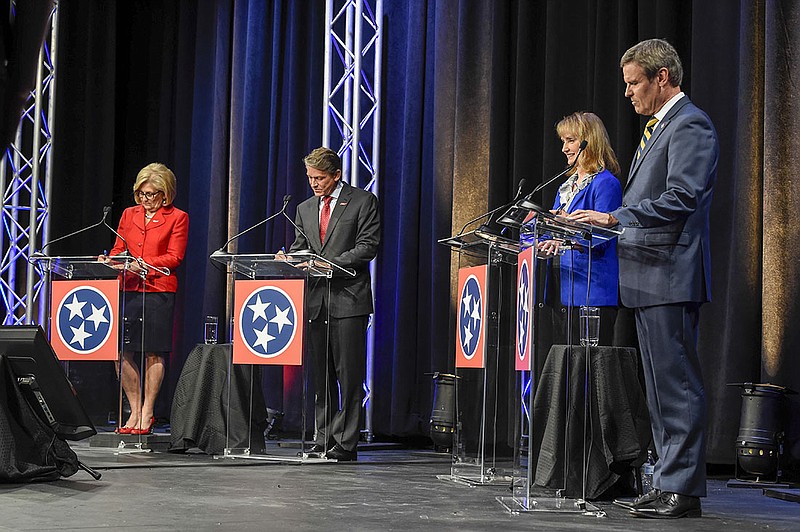NASHVILLE, Tenn. (AP) - Four candidates who have spent tens of millions of dollars of their own wealth fighting over who is more devoted to President Donald Trump face off Thursday in the Republican primary for Tennessee governor.
Meanwhile, former Democratic Gov. Phil Bredesen and Republican U.S. Rep. Marsha Blackburn face only nominal primary opposition in their high-profile race to replace retiring Republican Sen. Bob Corker, one of several contests that could decide control of the Senate.
The state, like its southern neighbors, was once dominated by Democrats. But it hasn't elected one to statewide office since 2006, and in 2012 Republicans secured supermajorities in both houses for the first time since Reconstruction. Tennessee favored Trump by 26 percentage points in 2016.
The contest to succeed popular term-limited Republican Gov. Bill Haslam has attracted four leading Republicans: U.S. Rep. Diane Black, former state economic development chief Randy Boyd, businessman Bill Lee, and state House Speaker Beth Harwell. Together, they've put some $40.2 million of their own money into the race and have spent a record $45.7 million total.
With the spending spree, the candidates have fought over who's more loyal to the president and his tough-on-immigration priorities.
Vice President Mike Pence has offered support for Black. But Trump has stopped short of endorsing her, despite keeping her by his side and praising her during events.
Nashville resident Robert Crowell, 69, said he voted for Black because he'd frequently seen her on TV talking about her platform. "I just voted for the American politicians that believe in a strong national defense and protecting our borders," he added. "...Tennessee is a more conservative state. I just go with the ones that agree with the president."
In the race for the Democratic nomination for governor, the two leading candidates have been more cordial. Former Nashville Mayor Karl Dean has outspent state House Minority Leader Craig Fitzhugh $4.4 million to $984,800, though Fitzhugh has peeled off important endorsements from state employees' and teachers' groups.
Both candidates say they're leaders who can break down partisan barriers and make government work during divisive political times - messaging that points to the tightrope Democrats must walk to get elected statewide in Tennessee.
Any Democratic nominee for either governor or senator would need the support of moderate Republicans and independents.
Bredesen was the last Democrat to pull that off, winning all 95 counties in his 2006 gubernatorial re-election. Blackburn has aligned herself strongly with the White House and held public events in Tennessee with Trump and Pence.
Diane Dimel said Thursday outside her Nashville polling place that though she's a registered Republican and cast her ballot for Harwell in the governor race, she probably won't vote that way in the general election. "I'll probably vote for a Democratic governor, and sadly because of our president, I am probably going to change my party affiliation," said Dimel, explaining that she voted for Trump in a tough decision but no longer supports him.
In a Thursday appearance, Gov. Haslam touted Blackburn's candidacy and echoed her in saying that keeping Republican Senate control is important in part because Tennessee Sen. Lamar Alexander would lose his health committee chairmanship.
Haslam told a room of Republicans that their role is to remind people of "the Marsha you've known for a long time." He also told reporters that he has a good relationship with former Gov. Bredesen but that "this is about who I think would be the best person to represent Tennessee in Washington."
If elected, Bredesen has said, he doesn't have a commitment to support Minority Leader Chuck Schumer for majority leader should Democrats win Senate control. Bredesen has pledged to be an independent voice and make decisions for Tennessee's interests.
Daniel Tashian of Nashville said he voted for Bredesen, along with Dean in the governor race, after several texts from his mother-in-law reminding him to hit his polling place.
"I feel like Karl Dean did a good job helping Nashville kind of grow," Tashian said, and "Phil Bredesen is very low key, but seems to be kind and thoughtful."
For months, Bredesen and Blackburn have looked beyond the primary and campaigned as if the general election had already started.
A general election win would be historic for either Black or Blackburn, since the state has never elected a woman as governor or U.S. senator.
Their bids for higher office, as well as the retirement of Knoxville Republican Rep. John Duncan Jr., have cleared the way for competitive, open contests in three of the state's nine U.S. House seats.
Harwell and Fitzhugh's decision to run for governor means the top leadership spots in both parties at the General Assembly will be up for grabs next year, even as new members will be elected to replace 18 Republicans and seven Democratic incumbents who aren't seeking re-election in the House. In addition, two Democrats and one Republican in the Senate are retiring.
Elaine and Cliff Seltzer are retired New Yorkers who moved to Nashville about a decade ago, and they said they were so angry about President Trump they voted straight-Democrat ballots as a way to thwart him and change the country's direction.
"There was no question that I was going to vote today," Elaine Seltzer said.
